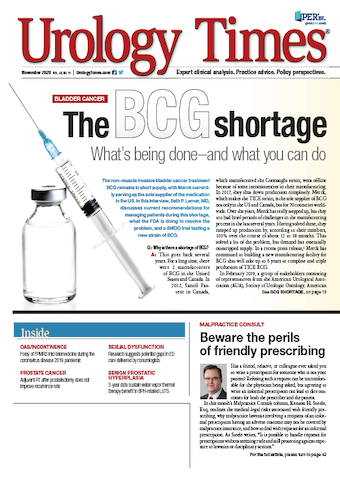Why urologists should beware the perils of friendly prescribing
Here’s how to guard against lawsuits and disciplinary actions.
Kenton H. Steele, Esq

Nearly every physician receives requests for prescriptions from coworkers or friends. Granting these requests can take the form of “friendly prescribing,” a situation in which a prescription is provided outside a physician’s normal practice. In an attempt to be helpful, care providers can expose themselves to a risk of being sued, losing insurance coverage, and facing disciplinary investigations. Luckily, there are ways to avoid or minimize these risks while still being a helpful friend.
Imagine the following scenarios: A nurse in your office says, “Doctor, can you call in a prescription for my hypertension medicine? I’m out of refills, and my doctor charges me $100 a visit.” Or a neighbor you know well calls and says, “Doc, I have a cross-country flight coming up and a terrible fear of flying. Can you prescribe me 2 Valium for the trip? I won’t have time to schedule a visit with my doctor before my trip.”
In any variation of these situations, the pressures on the physician are the same. An acquaintance is asking for something that the physician can easily give. Refusing this type of request would surely seem like an insult. How can you say no without the implication being “I could help you, but I won’t because I just don’t care enough about you”?
Unfortunately, even setting aside adverse drug reactions that could stem from informal prescribing, providing a friendly prescription can create a variety of medico-legal risks beyond those associated with a normal patient encounter.
Claims may not be covered by malpractice insurance
If an individual who receives an informal prescription suffers an adverse outcome and a malpractice suit is filed, this claim may not be covered by malpractice insurance. The reason is simple: A friend or acquaintance provided with a prescription may not be a true “patient.”
In one tragic story involving friendly prescribing, an emergency department (ED) physician was asked by a nurse for a prescription for Zoloft for her husband, who had been struggling with depression. The ED physician wrote a prescription for 1 month of medication, just long enough for the husband to make an appointment with a psychiatrist.
Two weeks later, the nurse’s husband took his own life. The widowed nurse sued the ED physician for malpractice on the basis that the physician did not consider that increased risk of suicidal thoughts is a complication for patients starting Zoloft. Ultimately, the ED physician’s malpractice carrier refused to provide coverage for the case because the husband was not one of the physician’s patients.
Even when an informal prescription does not lead to an adverse health outcome, it can still create headaches for practitioners. “Hallway medicine” can run afoul of laws and regulations related to the requirement that an in-person evaluation be performed before a prescription is issued. Moreover, the modified or informal practices associated with writing a friendly prescription can lead to disciplinary actions from a state medical board.
In one recent case, a nurse asked a surgeon for a written prescription for an OTC medication. The nurse needed the prescription to use her health savings account for the purchase. The physician provided a partially completed handwritten prescription, leaving it to the nurse to fill in the specifics. A hospital administrator found the nearly blank prescription on a desk, and both the nurse and the surgeon were investigated by their employer and licensing authorities.
This scenario did not even involve a medication that required a prescription. Yet the physician was still subjected to an investigation by the state medical board for issuing a prescription without keeping proper records.
Best practices for friendly prescriptions
It is possible to handle requests for prescriptions without seeming rude and still protecting against exposure to lawsuits or disciplinary actions. The first step is treating the request as if it comes from a real patient. This means conducting an examination and creating a written record of the encounter. Use of an electronic medical record system can be very helpful in this regard. Creating a record that shows the friend was treated like a normal patient reduces the possibility that an insurer will deny coverage in the event of a lawsuit.
If an acquittance needs a prescription urgently and a physical exam is not possible, physicians should create some contemporaneous record reflecting this fact. Such a record may be very useful in defusing any investigation by a licensing authority. Ultimately, failing to take these simple steps while helping a friend with a request for medication could result in proving the truth of the adage “No good deed goes unpunished.”
Steele is an attorney in the Columbus, Ohio office of Reminger Co., LPA. He specializes in malpractice defense and insurance litigation. Please contact him at KSteele@reminger.com with any feedback or comments on this column..

Malpractice Consult: What to know about direct examination of expert witnesses
December 4th 2023"In the 21st century, expert witnesses serve a vital role in presenting evidence to a jury. A good expert will be able to distill complex information into digestible elements the jurors can understand," writes Austin Richards, Esq.
Urology Malpractice: Kenton H. Steele, Esq, discusses expert witnesses from the attorney perspective
August 25th 2021“Their opinions do need to be credible and be honest, but there is some component of being able to walk a line between providing a candid, unbiased opinion, and knowing that you are retained to represent a specific side in that case,” says Kenton H. Steele, Esq.
Researchers evaluate data on priapism malpractice litigation
July 30th 2021“I think it's the responsibility of the physician to really take on educating and counseling and setting clear expectations and that way, when complications do arise, patients are better equipped, and they have a more favorable outcome,” says Ariana Matz, MD.
